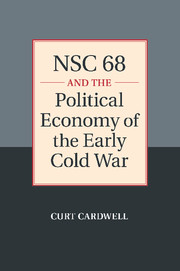Book contents
- Frontmatter
- Contents
- Acknowledgments
- Abbreviations
- Introduction
- 1 NSC 68 and the Problem of Origins
- 2 Multilateralism, the Soviet Threat, and the Origins of the Cold War
- 3 Multilateralism, the Dollar Gap, and the Origins of the Cold War
- 4 The Dollar Gap and Its Discontents
- 5 The British Sterling-Dollar Crisis of 1949–1950
- 6 The Origins and Development of NSC 68
- 7 The Political Economy of Rearmament
- Conclusion
- Select Bibliography
- Index
- References
Introduction
Published online by Cambridge University Press: 05 July 2011
- Frontmatter
- Contents
- Acknowledgments
- Abbreviations
- Introduction
- 1 NSC 68 and the Problem of Origins
- 2 Multilateralism, the Soviet Threat, and the Origins of the Cold War
- 3 Multilateralism, the Dollar Gap, and the Origins of the Cold War
- 4 The Dollar Gap and Its Discontents
- 5 The British Sterling-Dollar Crisis of 1949–1950
- 6 The Origins and Development of NSC 68
- 7 The Political Economy of Rearmament
- Conclusion
- Select Bibliography
- Index
- References
Summary
In 1994, James Baker, wealthy lawyer, scion of the Texas elite, and long-time Washington insider, delivered a speech before the Rotary Club of Washington, DC. The occasion was the club's annual foreign relations seminar, a subject on which Baker knew a great deal. Out of government in 1994, Baker had a distinguished record of public service, one that placed him at the center of the “Reagan revolution,” as former Hollywood actor and California governor Ronald Reagan's victory in the 1980 presidential campaign has come to be known. A former Marine Corps officer, Baker managed Reagan's victorious 1980 presidential run, served as White House chief of staff during Reagan's first term, secretary of the treasury during his second, and also was a fixture on the National Security Council. Part of this tenure occurred at the height of the “Reagan Cold War,” when tensions between the two superpowers once again rose to a fever pitch before settling into cautious coexistence. Under George Herbert Walker Bush, Baker served as secretary of state during one of the most momentous times in modern history – the collapse of the Berlin Wall and the end of the Cold War. Baker, it is fair to say, was a Cold War warrior par excellence, which is what makes his comments before the Rotary Club on that day in 1994 so startling.
- Type
- Chapter
- Information
- Publisher: Cambridge University PressPrint publication year: 2011



